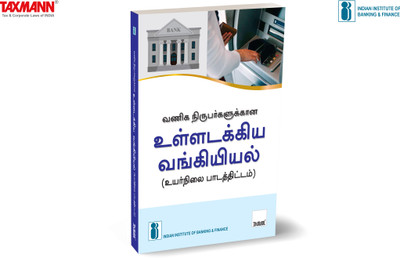IIBF X Taxmann's Inclusive Banking Through Business Correspondents (Advanced Course) | Tamil ŌĆō Essential resource for persons who will be acting as full-fledged BCs & managing CSPs(Paperback, Indian Institute of Banking, Finance)
Quick Overview
Product Price Comparison
This comprehensive guide is essential for individuals aspiring to become Business Correspondents (BCs) or Business Facilitators (BFs) in India's evolving financial landscape. This guide is designed to equip candidates with the knowledge and skills needed to effectively serve as a bridge between banks and the unbanked or underbanked segments of society, thereby contributing significantly to the overall economic development of India. This book has been developed under the guidance of the Indian Banks' Association (IBA) and the Reserve Bank of India (RBI). It addresses the operational and reputational risks banks face when engaging BCs and underscores the need for skill development in these roles. It adopts a modular approach, ensuring a coherent and logical flow of content, and the content includes a mixture of theoretical knowledge and practical insights, which is as follows: (1) General Banking (2) Financial Inclusion and Role of Business Correspondents (3) Technical Skills (4) Soft Skills and Behavioural Aspects It is an invaluable resource for practising bankers and institutions seeking a deeper understanding of financial inclusion, the BC/BF model, and the certification aspirants. The Present Publication is the 2024 Edition, revised and updated by Mr K.S. Padamnabhan | Retd. CGM ŌĆō NABARD. Taxmann exclusively publishes this book for the Indian Institute of Banking and Finance with the following noteworthy features: (1) [Structure of Indian Banking and Types of Banks] This section discusses the Indian banking system's framework, exploring the variety of banks and their functions alongside recent trends in banking (2) [Banking Services and Operations] It discusses various deposit schemes, account opening procedures, KYC mechanisms, and banking operations. It also includes chapters on accounting, finance, and principles of sound lending, with a special focus on retail lending (3) [Risk Management and Regulatory Frameworks] The book addresses asset classification, methods of recovery, and the integrated ombudsman scheme, emphasizing the importance of risk and fraud management in banking operations (4) [Financial Inclusion and the Role of BC/BF] This critical section discusses financial inclusion, detailing the BC/BF model, the need for such a model, and the roles and responsibilities involved. It also sheds light on government schemes promoting financial inclusion. (5) [Technical Skills for Business Correspondents] This section makes the reader understand how to handle micro ATMs, biometric devices, basic connectivity issues, digital banking products, and recent developments in digital banking (6) [Soft Skills and Behavioural Aspects] The book underlines the importance of soft skills for business correspondents, including relationship building, negotiation skills, dealing with various types of customers, and strategies for loan recovery. The detailed contents of this book are as follows: (1) Module A ŌĆō General Banking (A) Structure of Indian Banking and Types of Banks (i) Overview of the Indian banking system (ii) Functions and regulation of banks in India (iii) Recent trends in banking (B) Various Deposit Schemes and Other Services (i) Details on different types of deposits (ii) Introduction to the DICGC and RBI Retail Direct Scheme (iii) Discussion on remittances (C) Account Opening, On-boarding Process, KYC Mechanism, and Operations (i) Procedures for opening bank accounts (ii) Importance of KYC in banking operations (iii) Guidelines for account operations and closure (D) Accounting, Finance & Operations (i) Basics of accounting and book maintenance (ii) Understanding of finance and bank operations (E) Principles of Sound Lending (i) Discussion on lending principles (ii) Relationship between interest spread and profitability (F) Loans and Advances with a Special Focus on Retail Lending (i) Various types of loans, including retail, education, and housing loans (ii) Introduction to credit cards and MSME loans (G) Asset Classification and Methods of Recovery (i) Definition and classification of Non-Performing Assets (NPAs) (ii) Various methods for loan recovery (H) Grievance Redressal Mechanism in Banks and Integrated Ombudsman Scheme (i) Understanding customer grievances and redressal mechanisms (ii) Introduction to the Integrated Ombudsman Scheme (I) Overview of the Financial Market (i) Examination of the Indian financial market and its regulators. (ii) Deposit schemes and services (iii) Account opening, KYC processes, and banking operations (iv) Principles of sound lending, loans, advances, and asset classification (v) Grievance redressal mechanisms in banking (2) Module B ŌĆō Financial Inclusion and Role of Business Correspondents (J) Financial Inclusion (i) Concept and need for financial inclusion (ii) Roles and Responsibilities of Business Correspondents/Facilitators (K) Financial Education and Financial Counselling (i) Importance of financial education (ii) Roles of financial counsellors in education and cross-selling (L) Government Schemes for Promoting Financial Inclusion (i) Overview of schemes like PMJDY, PMJJBY, and PMSBY (ii) Discussion on the National Strategy for Financial Inclusion (3) Module C ŌĆō Technical Skills (M) Basic Technical Skills (i) IT skills for financial inclusion using the BC Model (ii) Technology for low-cost financial inclusion (N) Digital Banking Products (i) Need and types of digital banking products (ii) Introduction to mobile banking, internet banking, and ATMs (O) Recent Developments in Digital Banking (i) Developments like CBDC and account aggregators (4) Module D ŌĆō Soft Skills and Behavioural Aspects (P) Basic Skill Requirements for Business Correspondents (i) Difference between soft and hard skills (ii) Soft skills for building relationships (Q) Dealing with Various Types of Customers & Strategies for Recovery of Loans (i) Techniques for dealing with different customer types (ii) Strategies for Effective Loan Recovery

